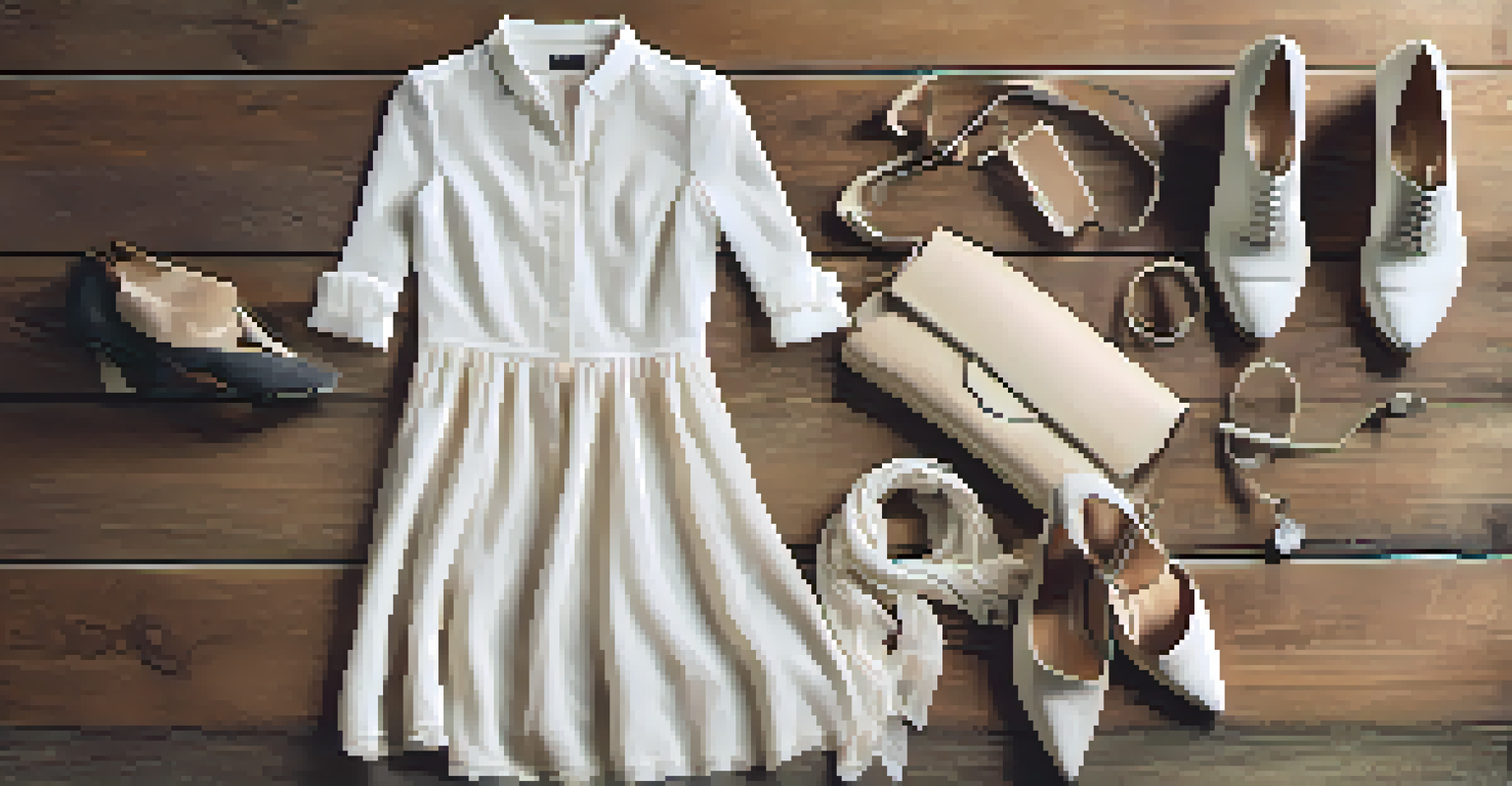The Future of Fashion Rentals: Convenience Meets Sustainability

Understanding Fashion Rentals: A Quick Overview
Fashion rentals have become an increasingly popular option for consumers looking to access high-quality clothing without the commitment of ownership. This model allows individuals to borrow outfits for special occasions or everyday wear, making it a convenient alternative to traditional shopping. With the rise of platforms like Rent the Runway and Le Tote, the rental market has expanded, tapping into both casual and luxury fashion.
Fashion is about dressing according to what’s fashionable. Style is more about being yourself.
The concept of fashion rentals is rooted in the sharing economy, where access is prioritized over ownership. This shift not only caters to the modern consumer's desire for variety but also promotes a more sustainable approach to fashion. When people rent instead of buy, they reduce the demand for fast fashion, which is notorious for its negative environmental impact.
As awareness of sustainability grows, more brands are integrating rental services into their offerings. This trend illustrates a broader cultural shift towards mindful consumption, where consumers seek to make ethical choices while enjoying the latest styles. In essence, fashion rentals present a win-win scenario for fashion lovers and the planet alike.
The Sustainability Factor: Why Rentals Matter
Sustainability in fashion has become a critical topic, as the industry grapples with its environmental impact. Clothing production contributes significantly to pollution, waste, and resource depletion, making the need for sustainable practices more urgent. Fashion rentals provide a practical solution by extending the life cycle of garments and minimizing waste.

When consumers choose to rent instead of purchase, they help reduce the number of new garments produced. This not only conserves resources but also lessens the carbon footprint associated with manufacturing, shipping, and disposing of clothing. Consequently, renting has emerged as a powerful tool in the fight against fast fashion's detrimental effects.
Fashion Rentals Promote Sustainability
By choosing to rent clothes, consumers help reduce waste and the demand for fast fashion, contributing to a more sustainable fashion industry.
Moreover, rental platforms often prioritize quality and durability in their offerings, encouraging brands to produce garments that last longer. This focus on longevity further enhances the sustainability aspect of fashion rentals, creating a more responsible and eco-conscious marketplace. In this way, renting can be seen as a pivotal step toward a more sustainable fashion industry.
Convenience: How Rentals Fit Into Modern Lifestyles
In today's fast-paced world, convenience is king. Fashion rentals cater to busy lifestyles by allowing consumers to quickly access a diverse range of clothing options without the hassle of traditional shopping. With just a few clicks, individuals can find the perfect outfit for any occasion, from weddings to casual outings.
Sustainability is no longer about doing less harm. It's about doing more good.
The ease of renting extends beyond just selecting an outfit. Many rental services handle the logistics, including dry cleaning and returns, freeing up time for consumers to focus on other aspects of their lives. This seamless experience makes fashion rentals an attractive option for those who value both style and efficiency.
Additionally, rental services often offer subscription models, allowing consumers to rotate their wardrobe regularly. This not only keeps their style fresh but also eliminates the stress of overstuffed closets filled with rarely worn items. As a result, renting aligns perfectly with the desires of modern consumers seeking flexibility and convenience in their fashion choices.
Challenges in the Fashion Rental Industry
Despite the advantages of fashion rentals, the industry faces several challenges that could impact its growth. One significant hurdle is the perception of quality and hygiene associated with rented clothing. Some consumers may hesitate to wear items that have been previously worn by others, leading to concerns about cleanliness and condition.
To address these concerns, rental companies are implementing rigorous cleaning processes and quality checks to ensure garments meet high standards. Transparency about these practices can help assuage fears and build trust with potential renters. Additionally, providing detailed information about the clothing's journey can enhance consumers' confidence in the rental experience.
Convenience Drives Rental Popularity
Fashion rentals cater to busy lifestyles by providing quick access to diverse clothing options without the hassle of traditional shopping.
Another challenge is the need for an efficient logistics system to manage returns and exchanges. As the demand for rentals grows, companies must invest in technology and infrastructure to handle the increased volume effectively. Balancing convenience with operational efficiency will be crucial for the industry's long-term success.
The Role of Technology in Fashion Rentals
Technology has played a pivotal role in the evolution of fashion rentals, transforming the way consumers discover and access clothing. Online platforms and mobile apps make it easy for users to browse collections, read reviews, and select items that suit their style and needs. This accessibility has contributed to the rapid growth of the rental market.
Moreover, advancements in artificial intelligence and data analytics allow rental services to personalize recommendations based on individual preferences and past rentals. This tailored approach enhances the user experience and encourages repeat business, as consumers are more likely to find pieces they love. As technology continues to evolve, so too will the capabilities of rental platforms.
Additionally, virtual fitting rooms and augmented reality features are emerging trends that can further revolutionize the rental experience. These innovations provide consumers with a chance to visualize how garments will look on them before making a rental decision. Embracing such technologies will not only improve customer satisfaction but also set rental companies apart in a competitive market.
The Influence of Social Media on Fashion Rentals
Social media has become a powerful driver of trends and consumer behavior, significantly impacting the fashion rental landscape. Platforms like Instagram and TikTok allow influencers and everyday users to showcase their rented outfits, inspiring their followers to explore rental options for themselves. This organic promotion has contributed to the growing acceptance of fashion rentals among various demographics.
Furthermore, the visual nature of social media aligns perfectly with the aesthetic appeal of fashion. Users are more likely to engage with content that highlights unique and stylish outfits, and rentals offer a way to achieve that without the hefty price tag. This not only fosters a sense of community but also encourages users to share their rental experiences.
Technology Enhances Rental Experiences
Advancements in technology, such as AI and virtual fitting rooms, are transforming how consumers discover and engage with fashion rentals.
As brands recognize the influence of social media, many are collaborating with influencers to promote their rental services. These partnerships can help demystify the rental process and showcase the versatility of rented clothing. Ultimately, social media serves as a catalyst for change, encouraging more consumers to consider fashion rentals as a viable and trendy option.
The Future: What Lies Ahead for Fashion Rentals
Looking ahead, the future of fashion rentals appears bright as both consumers and brands increasingly prioritize sustainability and convenience. With a growing emphasis on eco-friendly practices, more companies are likely to adopt rental models to meet the demands of conscious consumers. This shift could lead to an even wider variety of options, catering to diverse styles and preferences.
Additionally, as technology continues to advance, we can expect to see more innovative solutions that enhance the rental experience. From improved logistics to personalized shopping experiences, the integration of technology will play a crucial role in shaping the future of fashion rentals. Businesses that embrace these changes will likely thrive in a rapidly evolving market.

Ultimately, the marriage of convenience and sustainability in fashion rentals reflects a larger cultural shift towards responsible consumption. As the industry adapts and grows, consumers can look forward to a new era of fashion that values both style and the planet. The future of fashion rentals is not just about what we wear; it's about how we choose to wear it responsibly.